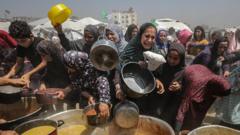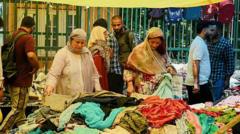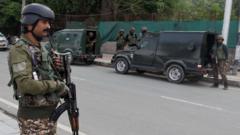Kashmiris endure the brunt of the India-Pakistan conflict, facing nightly bombardments and deteriorating living conditions, as the geopolitical tensions continue to escalate, highlighting the dire need for comprehensive peace solutions.
Perils of Everyday Life: Kashmir’s Struggles Amid India-Pakistan Tensions

Perils of Everyday Life: Kashmir’s Struggles Amid India-Pakistan Tensions
The ongoing conflict between India and Pakistan in Kashmir inflicts profound hardships on the local population, overshadowed by military confrontations.
In Kashmir, the backdrop of military tensions between India and Pakistan significantly impacts the daily lives of its residents, often leaving them to bear the heaviest consequences. Last week, an ordinary evening unfolded in a small village called Garkote, situated on the Indian-administered side of the conflict-ridden region. Amidst hopes that a clear night with lights visible from the Pakistani side would mean safety, an ominous announcement from a local mosque urged residents to stay indoors, signaling impending shelling.
Showkat Nanda, a journalist who has reported extensively on the unrest in Kashmir, shares his personal experience of witnessing the harsh realities of civilian life amidst military aggression. Despite numerous instances of gunfire throughout his life, he had not encountered a night bombarded by military action until this recent clash. The sequence of events post-announcement was all too familiar to locals, who understood that darkness would soon be broken by the sounds of artillery.
The hostility between India and Pakistan has not just persisted in military capacities but has also resulted in a grim routine for Kashmir's inhabitants. Families like that of Nanda’s friend, Irshad Khwaja, must navigate their existence amid the backdrop of potential violence and uncertainty. As the clashes between the military forces escalate, the local populace remains gravely affected, with their plight often overshadowed by the broader geopolitical narrative.
As tensions have intensified, it becomes increasingly clear that any resolution must take into account the humanitarian needs of the region. The lives of ordinary Kashmiris serve as a poignant reminder of the costs associated with political disputes and the pressing necessity for durable peace initiatives that prioritize the welfare of individuals over territorial gains.
Showkat Nanda, a journalist who has reported extensively on the unrest in Kashmir, shares his personal experience of witnessing the harsh realities of civilian life amidst military aggression. Despite numerous instances of gunfire throughout his life, he had not encountered a night bombarded by military action until this recent clash. The sequence of events post-announcement was all too familiar to locals, who understood that darkness would soon be broken by the sounds of artillery.
The hostility between India and Pakistan has not just persisted in military capacities but has also resulted in a grim routine for Kashmir's inhabitants. Families like that of Nanda’s friend, Irshad Khwaja, must navigate their existence amid the backdrop of potential violence and uncertainty. As the clashes between the military forces escalate, the local populace remains gravely affected, with their plight often overshadowed by the broader geopolitical narrative.
As tensions have intensified, it becomes increasingly clear that any resolution must take into account the humanitarian needs of the region. The lives of ordinary Kashmiris serve as a poignant reminder of the costs associated with political disputes and the pressing necessity for durable peace initiatives that prioritize the welfare of individuals over territorial gains.






















